|
|
|
Sort Order |
|
|
|
Items / Page
|
|
|
|
|
|
|
| Srl | Item |
| 1 |
ID:
174002


|
|
|
|
|
| Summary/Abstract |
In Inventing the Future, Nick Srnicek and Alex Williams implore those on the left not to fear automation but rather to harness it in order to overturn neoliberalism. However, their argument is built upon a controversial philosophy which goes unnamed in the body of the text: accelerationism, the first principles of which would overthrow the very understanding of human nature on which Western democracy has operated for centuries. Their vision also entails a way of doing politics and designing policy which radically differs from representative democracy and grassroots movements as they seek to engineer consent and to form a revolutionary vanguard—not just to overthrow capitalism, but to embark on a journey of continually re‐engineering humanity itself.
|
|
|
|
|
|
|
|
|
|
|
|
|
|
|
|
| 2 |
ID:
154359
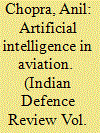

|
|
|
|
|
| Summary/Abstract |
Aviation is one of the most heavily regulated industries in the world due to safety reasons. Strict regulations have helped the avition industry provide the safest way the transport per mile travelled. Aviation incidents are few and far between, and are getting rarer every year. Some degrees of automation have indeed helped get aviation to where it currently is. But human control and intervention have always been at the heart of it. form pilots to Air Traffic Controllers. This is about to change.
|
|
|
|
|
|
|
|
|
|
|
|
|
|
|
|
| 3 |
ID:
178342
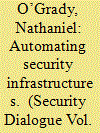

|
|
|
|
|
| Summary/Abstract |
This article contributes to emergent debates in critical security studies that consider the processes and effects that arise where new forms of automated technology begin to guide security practices. It does so through research into public Wi-Fi infrastructure that has started to appear across the globe and its mobilization as a device for warning the public about emergencies. I focus specifically on an iteration of this infrastructure developing in New York called LinkNYC. According to the infrastructure’s operators, the processes that underpin emergency communication have gradually become ‘automated’ to accelerate LinkNYC’s deployment during crises. The article pursues three lines of inquiry to explore the automation of security infrastructure, in turn making three correspondent original contributions to wider debates. First, it unpacks the real-time analytics and platform-based data-sharing techniques cultivated to automate emergency communication. Here, I expand understanding of the new forms of automation now integrated into technologies harnessed for security and their practical effects. These forms of automation, I demonstrate secondly, are situated by those governing into wider imaginaries concerning the transformative promise automation bears. I argue that the proliferation of these imaginaries play a crucial role in justifying and dictating the enrolment of new devices into security. Third, it explores how automation affords private companies the opportunity to exercise discretionary decisionmaking that changes how and when infrastructure should operate during emergencies. Developing this argument, I add new dimensions to debates regarding the political ramifications associated with automation by claiming that automation redistributes authority across the public and private organizations that increasingly coordinate in bringing new technologies to bear in the security domain.
|
|
|
|
|
|
|
|
|
|
|
|
|
|
|
|
| 4 |
ID:
041466
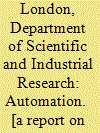

|
|
|
|
|
| Publication |
London, Her Majesty's Stationery Office, 1956.
|
| Description |
viii,106p.
|
|
|
|
|
|
|
|
|
|
|
|
Copies: C:1/I:0,R:0,Q:0
Circulation
| Accession# | Call# | Current Location | Status | Policy | Location |
| 001078 | 629.8/LON 001078 | Main | On Shelf | General | |
|
|
|
|
| 5 |
ID:
029765
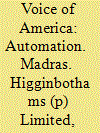

|
|
|
|
|
| Publication |
Madras, Higginbothams (p) Limited, 1968.
|
| Description |
304p
|
|
|
|
|
|
|
|
|
|
|
|
Copies: C:1/I:0,R:0,Q:0
Circulation
| Accession# | Call# | Current Location | Status | Policy | Location |
| 012101 | 004/VOI 012101 | Main | On Shelf | General | |
|
|
|
|
| 6 |
ID:
170340
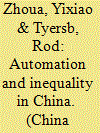

|
|
|
|
|
| Summary/Abstract |
In transitional economies, low wages imply sub-OECD yet growing labor shares of value added. China's rapid development has, however, seen a declining low-skill labor share and rising inequality. Here, a stylized model with three households and separable TFP and factor bias suggests a third of the decline in the low-skill share since 1994 is due to structural change and the rest mainly to skill-biased technical change. Expected future twists away from low-skill labor toward capital yield further inequality, moderated if strong TFP growth and population stability continue. But if the bias accompanies TFP shortfalls, worker displacement and rising inequality are in prospect.
|
|
|
|
|
|
|
|
|
|
|
|
|
|
|
|
| 7 |
ID:
154538
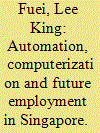

|
|
|
|
|
| Summary/Abstract |
Digitalization is expected to radically change the prospects of the types of occupations that will be needed in the future. This research note examines the susceptibility of jobs to computerization and automation in Singapore by drawing on the methodology and initial data in Frey and Osborne (2013). We find that about one-quarter of Singaporean employment is at high risk of computerization. This places the country as having one of the lowest proportions of jobs under high risk internationally. Within this high-risk category of workers, a significant number of them have non-tertiary educational qualifications and tend to be older adults, making them less likely to be re-employed if they lose their jobs.
|
|
|
|
|
|
|
|
|
|
|
|
|
|
|
|
| 8 |
ID:
183163
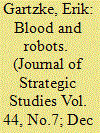

|
|
|
|
|
| Summary/Abstract |
New technologies such as Remotely Piloted Vehicles (RPVs) make it possible to remove human beings from direct involvement in combat. How will this evolving dynamic affect the practice and purposes of political violence? Will conflict become ‘costless’ in human terms as machines replace people on the front lines or will the logic of war continue to call for human sacrifice? While considerable attention has been devoted to the role of technology in transforming warfare, little is known about how new modes of combat will affect established motives for using force. I explore these political dimensions of new modes of conflict, drawing three basic conclusions. First, to the degree that substituting machines for humans lowers the costs for fighting, conflict will become more frequent, but less definitive. Second, in a reversal of previous trends, battlefield automation promises disproportionately to revitalise ground elements of military organisations. Finally, regrettably, new technologies should weaken inhibitions against targeting civilians.
|
|
|
|
|
|
|
|
|
|
|
|
|
|
|
|
| 9 |
ID:
150863
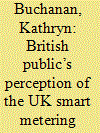

|
|
|
|
|
| Summary/Abstract |
Consumer acceptance of smart meters remains crucial in achieving the potential carbon emission reductions offered by advanced metering infrastructures. Given this, the present research used deliberative focus groups to examine what is needed to secure acceptance and engagement from domestic consumers with services, products and ‘offers’ in smarter power systems. Our findings suggest that consumers are able to identify not just threats relating to smart metering initiatives but opportunities as well. In particular, our focus group participants responded positively to the idea of an automated system that could be used to achieve energy savings in combination with time-of-use tariffs. We conclude by outlining suggestions for policy recommendations that may help consumer acceptance of smart meter enabled services be more readily achieved.
|
|
|
|
|
|
|
|
|
|
|
|
|
|
|
|
| 10 |
ID:
032083


|
|
|
|
|
| Publication |
New Jersy, Prentice Hall, 1969.
|
| Description |
xii, 371p
|
|
|
|
|
|
|
|
|
|
|
|
Copies: C:1/I:0,R:0,Q:0
Circulation
| Accession# | Call# | Current Location | Status | Policy | Location |
| 004435 | 004.22/FLO 004435 | Main | On Shelf | General | |
|
|
|
|
| 11 |
ID:
188323
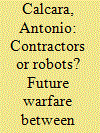

|
|
|
|
|
| Summary/Abstract |
Contemporary warfare is increasingly shaped by the complex relationship between the privatization of security and technologically driven automation. On the one hand, there is a growing tendency to employ private military and security companies for a range of military support tasks. On the other hand, the growing automation of security technologies is bound to make war less manpower intensive. Combat systems will have much more autonomy and humans will be working more closely with machines than they do today. The article provides an original analysis on the interplay between the privatization of security tasks and technologically driven automation and investigates their impact on the defence industry and the armed forces. These two sets of actors are arguably among the most impacted by the multi-faceted relations between privatization and automation. Technological progress creates the need for contractors to maintain and operate platforms that militaries do not have expertise to run. However, technologically driven automation - often developed in value chains far removed from the military-industrial pipeline - might also replace private contractors in non-core security tasks. The possibility to employ automated and autonomous systems will hence impact on the already delicate balance between private contractors and publicly-funded armed forces.
|
|
|
|
|
|
|
|
|
|
|
|
|
|
|
|
| 12 |
ID:
145842
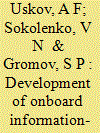

|
|
|
|
|
| Summary/Abstract |
The authors examine modern trends of onboard informationdriven systems development in domestic and foreign armored weapons and equipment items as well as possibilities of automation and intellectualization of control processes.
|
|
|
|
|
|
|
|
|
|
|
|
|
|
|
|
| 13 |
ID:
175173
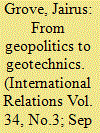

|
|
|
|
|
| Summary/Abstract |
This exploration provides an alternative future to that offered in the discussions surrounding what is often referred to by the ‘fourth industrial revolution’ or the ‘third offset’. I argue that even modest projections of existing trends have the capability of altering the grammar or ecology of geopolitics as well as the drivers for competition and catastrophe. Such changes are more significant than questions of how this or that actor might be different or which great powers may shape the international order in a hundred years. The essay seeks to understand what disruptive changes in non-human capability might mean for the shape of a potential geopolitics to come. In a more general sense, I want to think about how violence will be distributed differently. Will there be new sources and even kinds of competition unique to a global system populated and in some cases, structured by cunning machines – some mechanical, others digital – and what are the implications for how we imagine international relations?
|
|
|
|
|
|
|
|
|
|
|
|
|
|
|
|
| 14 |
ID:
171115
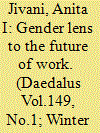

|
|
|
|
|
| Summary/Abstract |
Acquiring new skills will be foundational to surviving in and leading in the workplace of the future. Organizations must make concerted efforts in upskilling women to maintain high levels of productivity and growth. This acquisition of new skills will help women make the transition into new jobs that will be necessary due to automation and today's workplace realities. Without it, the workplace could become even more unbalanced than it is today. Further, today's gaps need to be filled in a holistic manner to ensure that not only are tomorrow's technologies created by a diverse group of people, but also that they are implemented in a human-centered manner that aligns with the original intention. The private sector has a vital role to play in preparing the workforce that it will need and should prototype holistic solutions to help respond to this critical need.
|
|
|
|
|
|
|
|
|
|
|
|
|
|
|
|
| 15 |
ID:
032085


|
|
|
|
|
| Publication |
New York, John Wiley & Sons, Inc., 1958.
|
| Description |
v 1(xx, 26-32p. +20p. Index)
|
| Contents |
Vol.1: Control Fundamentals
|
|
|
|
|
|
|
|
|
|
|
|
Copies: C:1/I:0,R:0,Q:0
Circulation
| Accession# | Call# | Current Location | Status | Policy | Location |
| 004605 | 004/GRA 004605 | Main | On Shelf | General | |
|
|
|
|
| 16 |
ID:
028708


|
|
|
|
|
| Publication |
New York, John Wiley & Sons, Inc, 1961.
|
| Description |
v 3 ( xxi, vp)
|
| Contents |
V 3: Systems and components
|
|
|
|
|
|
|
|
|
|
|
|
Copies: C:1/I:0,R:0,Q:0
Circulation
| Accession# | Call# | Current Location | Status | Policy | Location |
| 004607 | 004/GRA 004607 | Main | On Shelf | General | |
|
|
|
|
| 17 |
ID:
061015


|
|
|
|
|
| Publication |
New York, John Wiley & Sons, Inc., 1961.
|
| Description |
vp
|
| Contents |
vol.2: Computers and data processing
|
|
|
|
|
|
|
|
|
|
|
|
Copies: C:1/I:0,R:0,Q:0
Circulation
| Accession# | Call# | Current Location | Status | Policy | Location |
| 004606 | 004/GRA 004606 | Main | On Shelf | General | |
|
|
|
|
| 18 |
ID:
028704
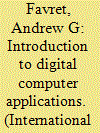

|
|
|
|
|
| Edition |
International student ed
|
| Publication |
New York, Van Nostrand Reinhold Company, 1969.
|
| Description |
x, 246p.
|
| Series |
Reinhold industrial engineering and management sciences series
|
|
|
|
|
|
|
|
|
|
|
|
Copies: C:1/I:0,R:0,Q:0
Circulation
| Accession# | Call# | Current Location | Status | Policy | Location |
| 003943 | 004/FAV 003943 | Main | On Shelf | General | |
|
|
|
|
| 19 |
ID:
101559
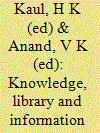

|
|
|
|
|
| Publication |
New Delhi, DELNET, 2010.
|
| Description |
xxviii, 443p.
|
| Standard Number |
9788190583855, hbk
|
|
|
|
|
|
|
|
|
|
|
|
Copies: C:1/I:0,R:1,Q:0
Circulation
| Accession# | Call# | Current Location | Status | Policy | Location |
| 055570 | 021.65/KAU 055570 | Main | On Shelf | Reference books | |
|
|
|
|
| 20 |
ID:
138193
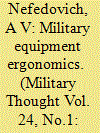

|
|
|
|
|
| Summary/Abstract |
The author addresses a subject at the forefront of many people's minds - making humans feel comfortable with the automated control systems of a warship, its armaments, weapons, and equipment - in the sense of how ergonomic they are in the human environment and how well military equipment is integrated into this environment all the way from design to operation.
|
|
|
|
|
|
|
|
|
|
|
|
|
|
|
|
|
|
|
|
|